Knowledge & Innovation Sessions - 12.10 to 13.10
 01. Deaf Utopia
01. Deaf Utopia
Led by Craig Crowley, Chief Executive, Action Deafness
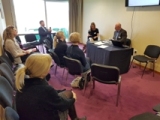 Surdi Domum Group (SDG)’s vision for the very first Deaf Extra Care village for older Deaf people would be planned, developed, built and delivered by Deaf people themselves. Its goal is for residents to live in a safe, accessible environment where Sign Language and communication needs will be met and Deaf culture celebrated.
Surdi Domum Group (SDG)’s vision for the very first Deaf Extra Care village for older Deaf people would be planned, developed, built and delivered by Deaf people themselves. Its goal is for residents to live in a safe, accessible environment where Sign Language and communication needs will be met and Deaf culture celebrated.
Older Deaf people will be able to live independently; maintain their lifestyle and well-being; and receive care support in the latter stages of their lives.
SDG’s aim is to move from concept to reality. The project will require scoping, consultation, planning and development; with knowledgeable consideration of the specific needs of potential clients.
 02. ExtraCare’s Community Locksmiths
02. ExtraCare’s Community Locksmiths
Led by Shirley Hall, Well-being and Community Manager, The ECCT and Michael Spellman, Enriched Opportunities Lead, The ECCT - @ExtraCareOrgUk
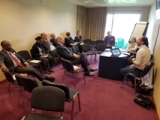 The Charity has extended its award winning Enriched Opportunities Programme, which supports residents with dementia, to the local community in Coventry. This service was funded initially by the Local Authority as a pilot, which has since been mainstreamed as part of the discharge to assess programme. Data presented shows how the Community Locksmith has worked with clients and their families enabling them to remain in their own homes, out of hospital, and more importantly not moving on to specialist nursing homes. The family perspective will also be shared by a client’s daughter.
The Charity has extended its award winning Enriched Opportunities Programme, which supports residents with dementia, to the local community in Coventry. This service was funded initially by the Local Authority as a pilot, which has since been mainstreamed as part of the discharge to assess programme. Data presented shows how the Community Locksmith has worked with clients and their families enabling them to remain in their own homes, out of hospital, and more importantly not moving on to specialist nursing homes. The family perspective will also be shared by a client’s daughter.
 03. An integrated housing and care offer
03. An integrated housing and care offer
Led by Kris Peach, Director of Extra Care, Housing & Care 21 - @HousingCare21
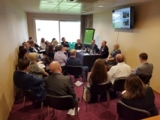 This session will examine the challenges and benefits of the integrated housing and care offer within the extra care service of Housing & Care 21. Through on-going dialogue with local authority commissioners and the University of Birmingham, we are seeking to understand the decision making process of commissioners and how stakeholders are influenced.
This session will examine the challenges and benefits of the integrated housing and care offer within the extra care service of Housing & Care 21. Through on-going dialogue with local authority commissioners and the University of Birmingham, we are seeking to understand the decision making process of commissioners and how stakeholders are influenced.
One issue which has been highlighted through these discussions is not only commissioners’ interest in understanding better the complexities of different options for the design and delivery of such projects, but also their need to meet the evidence requirements of other stakeholders.
 04. Five ideas for care in 2037
04. Five ideas for care in 2037
Led by Lex Cumber, Business Development Director, Castleoak - @castleoak
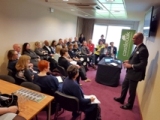 In this session we’ll embrace the festival of ideas concept and consider the UK’s care future.
In this session we’ll embrace the festival of ideas concept and consider the UK’s care future.
What will the physical, technological, financial and scientific environment look like in 2037 and how will our sector respond? What early indicators can we already see today, and what new approaches to care will we adopt in the future? This workshop demands audience participation!
 05. Digital Solutions and their application to the evolving Extra Care market
05. Digital Solutions and their application to the evolving Extra Care market
Led by Terry Stocks, Director - Head of Public Sector and Education - UK & Europe, Faithful+Gould - @fgouldconnect
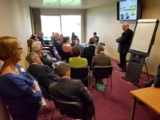 UK Government is supporting digital approaches to address the issues of a changing world. The UK faces continuing pressures on public finances, changing demographics and homes for the ageing, new political objectives and challenges to UK GDP.
UK Government is supporting digital approaches to address the issues of a changing world. The UK faces continuing pressures on public finances, changing demographics and homes for the ageing, new political objectives and challenges to UK GDP.
UK Government and Local Authorities are increasingly embracing technology to deliver assets and drive better outcomes across social and recreational services. Smart and Sustainable cities are an example where local authorities, service and utility providers have started to work together to develop solutions on a larger scale. Our session will outline the objectives of the UK Digital Built Britain Programme and the benefits such approaches can deliver in asset delivery, operations and delivery of front line services in the extra care market.
 06. The future for extra care housing: Refashioning the business case
06. The future for extra care housing: Refashioning the business case
Facilitated and Led by Ian Copeman, Housing LIN and Dan Gaul, Housing LIN Eastern Lead - @HousingLIN
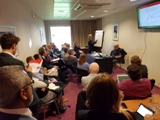 The market for older people's housing is changing. Opportunities will arise through the new dialogue with central government and potential improved funding streams with clearer long term revenue streams.
The market for older people's housing is changing. Opportunities will arise through the new dialogue with central government and potential improved funding streams with clearer long term revenue streams.
Robust business cases will be required that propose a holistic solution - not just reducing adult care residential care costs.
This interactive workshop will review the challenges and benefits of developing extra care in the new complex market. A new holistic financial model will be explored through a collaborative discussion to develop the model further.
 07. Accelerating construction of specialist housing
07. Accelerating construction of specialist housing
Led by Nigel Ingram Programme Lead Retirement Solutions Keepmoat - @keepmoatgroup
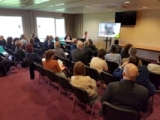 Nigel will share both Keepmoat's experience and present research & development work relating to his past and experiences at JRF. The session will cover offsite manufacturing and volumetric construction to illustrate how the development of specialist housing schemes can be accelerated to both increase supply and efficiency.
Nigel will share both Keepmoat's experience and present research & development work relating to his past and experiences at JRF. The session will cover offsite manufacturing and volumetric construction to illustrate how the development of specialist housing schemes can be accelerated to both increase supply and efficiency.
 08. Telecare: is it a problem or a solution? Findings from the UTOPIA (Using Telecare for Older People In Adult Social Care) online survey of English Local Authorities
08. Telecare: is it a problem or a solution? Findings from the UTOPIA (Using Telecare for Older People In Adult Social Care) online survey of English Local Authorities
Led by John Woolham, Senior Research Fellow at the Social Care Workforce Research Unit, King’s College London - @scwru
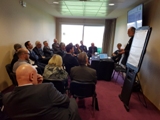 This presentation draws on findings from an online survey of local authority telecare lead managers carried out in 2016-17. 118 local authorities or their proxies took part – an overall response rate of 77%. It will share findings about factors that promote and inhibit the successful use of telecare for older people and how local authorities assess for, install maintain and respond to telecare in the homes of older people in England. The findings provide significant new evidence about telecare use that contribute to current debates about the appropriate role of telecare in cash-strapped adult social care settings.
This presentation draws on findings from an online survey of local authority telecare lead managers carried out in 2016-17. 118 local authorities or their proxies took part – an overall response rate of 77%. It will share findings about factors that promote and inhibit the successful use of telecare for older people and how local authorities assess for, install maintain and respond to telecare in the homes of older people in England. The findings provide significant new evidence about telecare use that contribute to current debates about the appropriate role of telecare in cash-strapped adult social care settings.
 09. Publication - Design Principles for Older Persons Housing (with and without care) – 2017 Revision
09. Publication - Design Principles for Older Persons Housing (with and without care) – 2017 Revision
Led by Anne-Marie Nicholson, Senior Partner, PRP - @PRP_News
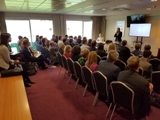 PRP have revisited and updated the design principles guide originally published by the Housing LIN in 2008. The finished document will be available on the Housing LIN website after the main conference. Much has changed in the 9 years since this guidance was put together. Anne-Marie Nicholson, Senior Partner at PRP will outline the contents of the latest edition highlighting the critical themes that have emerged since its first publication. The session will include reference to design features within schemes that have been considered as exemplary ‘Happi’ designs which can be discussed in the Q&A session.
PRP have revisited and updated the design principles guide originally published by the Housing LIN in 2008. The finished document will be available on the Housing LIN website after the main conference. Much has changed in the 9 years since this guidance was put together. Anne-Marie Nicholson, Senior Partner at PRP will outline the contents of the latest edition highlighting the critical themes that have emerged since its first publication. The session will include reference to design features within schemes that have been considered as exemplary ‘Happi’ designs which can be discussed in the Q&A session.
 10. HAPPI Dementia – The Brighton Story
10. HAPPI Dementia – The Brighton Story
Led by Judi Wilson, Willmott Partnership Homes & Rachel Sayers, Feilden Clegg Bradley Studios
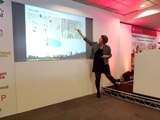 This session will examine Willmott Dixon’s new build Dementia scheme in Brighton, which has been developed and designed using the “HAPPI” principles.
This session will examine Willmott Dixon’s new build Dementia scheme in Brighton, which has been developed and designed using the “HAPPI” principles.
It will take you through the journey from procurement, master planning design through to delivery.
